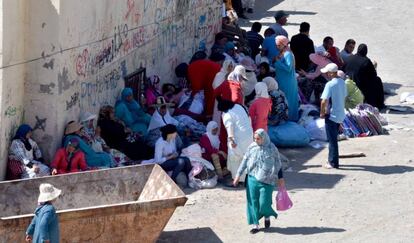The porters trapped on the wrong side of the Spanish-Moroccan border
More than 300 people, mostly women, are being forced to sleep rough since Tarajal crossing closed
Aziza has spent the last 36 hours sleeping rough and hasn’t eaten or drunk anything. One of the 3,000 or so Moroccan porters – mostly women – who make around €5 euros a day transporting huge bundles of duty free goods from Spain into Morocco, she is trapped in the Spanish exclave city of Ceuta, in North Africa.

The sudden closure of the Spanish side of the El Tarajal border on Wednesday in response to a major security breach that saw some 187 undocumented migrants rush through early on Monday morning caught her in Spanish territory with no money and no means to return home.
She says she has tried three times to cross the frontier with her lot of winter nightdresses she bought in Ceuta strapped under her clothing. “The Civil Guard send me back when they see what I am carrying, but I have to try. I cannot go home without money,” she explains.
We’re poor, and we’ll have to stay here, with no food and nowhere to sleep until they let us pass
Aziza, a Moroccan porter
Around 300 or so other women in her situation are currently trapped in a business area next to the border where they buy goods to take into Morocco. They have nowhere to go, and can only wait until August 16 at the earliest, when the Spanish authorities say they should have finished strengthening security at the border to prevent any further mass breaches like the one seen on Monday.
A few streets away from Aziza, Fatika sits on the ground, surrounded by bras she hopes to take into Morocco. She is desperate, and angry: “They have no right to do this. If we are already here, why not let us take our bundles? My two children are at home. I have to feed them and I need the €12 I make from doing this.”
Trade in the business zone – which sells everything from foodstuffs and clothing, to household products – has ground to a halt. The Spanish side of the El Tarajal crossing, which is normally gridlocked with the 12,000 or so vehicles that pass through each day loaded with goods, is virtually free of traffic.
The inadequate security at El Tarajal was highlighted by Monday’s mass breach, and the Spanish authorities, working in conjunction with their Moroccan counterparts, say the only way they can improve security along the fence is by deploying officers normally assigned to the goods crossing.
The pressure here is increasing all the time
Juan Carlos Linares, with the Ceuta Spanish police
Spanish government sources estimate there are around 1,500 mainly African men and women hiding in the forested hillsides around Ceuta, waiting for their opportunity to enter Spanish territory. Other sources put the figure as high as 3,000.
This is not the first time El Tarajal has been closed to goods. In May, the stampedes that followed the opening of a second crossing obliged the authorities to impose order. But this is the first time the border has been closed in response to the mounting numbers of mainly African migrants desperate to make their way into Spanish territory.
“The pressure here is increasing all the time,” says Juan Carlos Linares, with the Ceuta Spanish police. “We calculate that we are lacking around 20% of our workforce, which hasn’t been replaced for two weeks, when the pressure on the border was not so great as now,” he adds.
Jesús González Miaja, with the Ceuta police union, describes the border crossing as “old and obsolete.”
The Civil Guard send me back when they see what I am carrying, but I have to try. I cannot go home without money Aziza, a Moroccan porter
He says the migrants who stormed through the crossing on Monday morning were able to break a metal gate “which is rotten and has had to be welded.”
He notes that Moroccan personnel were unable to warn their Spanish counterparts of the migrants, not just because they were running, but because the crossing point is narrow and makes it difficult to deploy security forces. Officers at the checkpoint say the authorities have been promising “year after year” to improve the facilities there.
So far this week, there have been four attempts by large groups of migrants to breach the frontier.
Meanwhile, Fatika and Aziza will have to wait, sleeping rough on the beach at El Tarajal.
“We’re poor, and we’ll have to stay here, with no food and nowhere to sleep until they let us pass. We’ll have to put up with it,” says Aziza, close to tears. She staggers to her feet, straps her packets of nightdresses on and makes another bid to cross into Morocco. “Let’s see if I’m lucky this time.”
English version by Nick Lyne.
Tu suscripción se está usando en otro dispositivo
¿Quieres añadir otro usuario a tu suscripción?
Si continúas leyendo en este dispositivo, no se podrá leer en el otro.
FlechaTu suscripción se está usando en otro dispositivo y solo puedes acceder a EL PAÍS desde un dispositivo a la vez.
Si quieres compartir tu cuenta, cambia tu suscripción a la modalidad Premium, así podrás añadir otro usuario. Cada uno accederá con su propia cuenta de email, lo que os permitirá personalizar vuestra experiencia en EL PAÍS.
¿Tienes una suscripción de empresa? Accede aquí para contratar más cuentas.
En el caso de no saber quién está usando tu cuenta, te recomendamos cambiar tu contraseña aquí.
Si decides continuar compartiendo tu cuenta, este mensaje se mostrará en tu dispositivo y en el de la otra persona que está usando tu cuenta de forma indefinida, afectando a tu experiencia de lectura. Puedes consultar aquí los términos y condiciones de la suscripción digital.









































